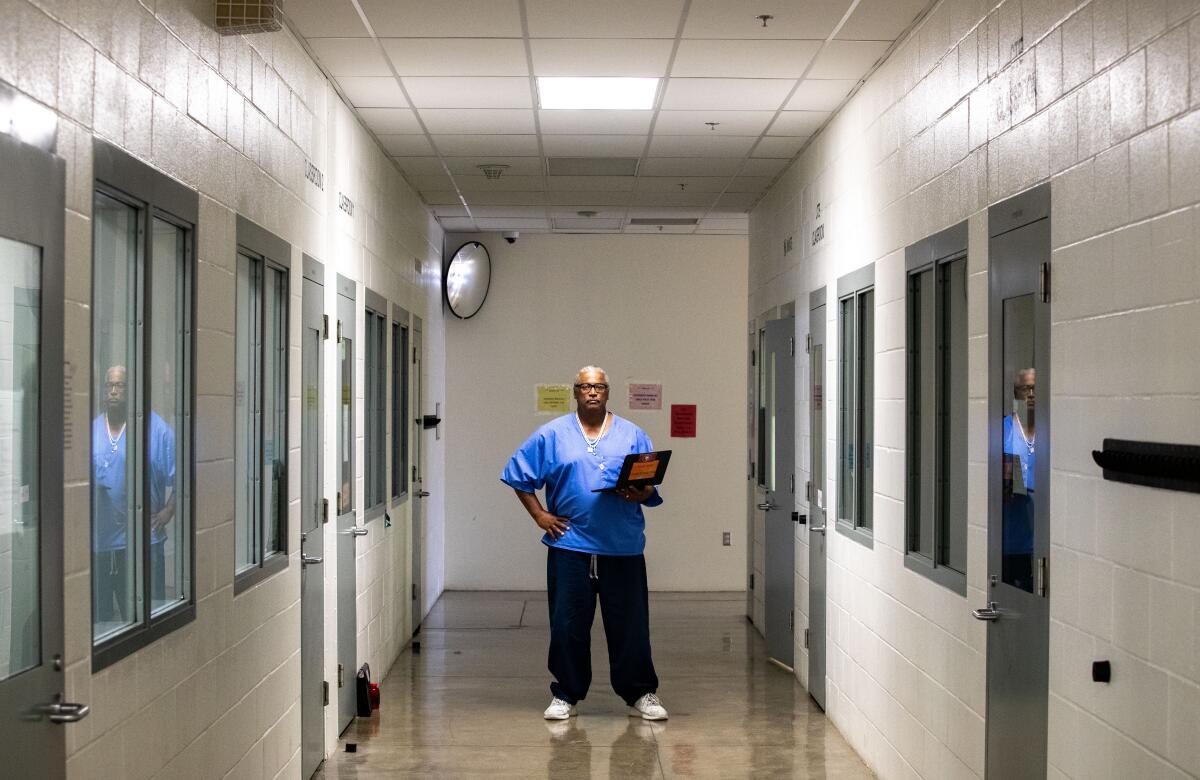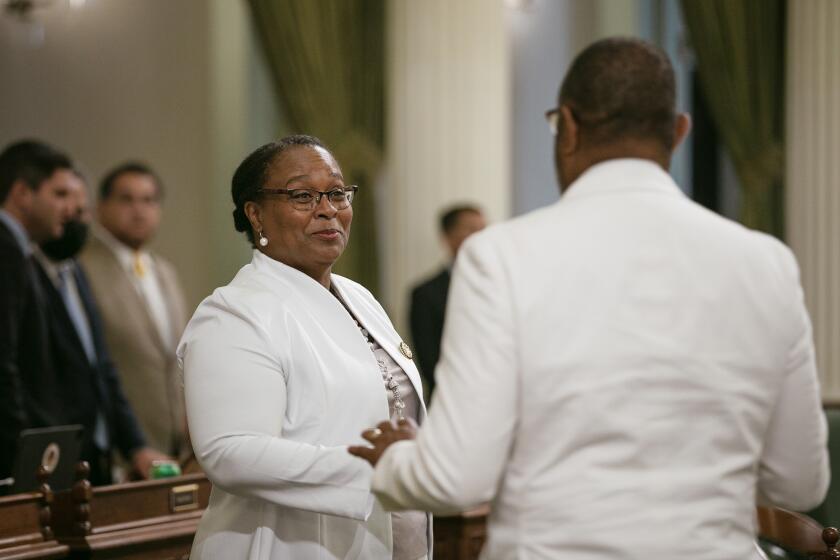Nevada just banned ‘slavery and involuntary servitude’ in prisons. Why didn’t California?

- Share via
- Though the ballot measures in neighboring states sounded similar, key differences may explain the diverging outcomes.
- Nevada’s measure included the word “slavery,” while California’s did not. California changed its Constitution in the 1970s to prohibit slavery.
- California’s measure would have banned mandatory work for prisoners. Nevada’s measure was largely symbolic, leaving it up to the courts to decide whether changes would be made to prison labor.
A progressive prison reform that was on the ballot in California and Nevada this month met drastically different outcomes after the votes were counted:
In California, voters chose to keep the status quo, allowing “involuntary servitude” to remain legal in prisons. On the other side of the state line, Nevada voters overwhelmingly passed a measure to ban “slavery and involuntary servitude.”
These diverging results in two neighboring states raised questions about whether Nevada voters, a majority of whom supported Donald Trump‘s successful bid to return to the White House, are more liberal on criminal justice issues than voters in deep-blue California, where Vice President Kamala Harris won.
Some have suggested that the failure of California’s Proposition 6 reflects a rightward shift in the state, where voters passed Proposition 36, the tough-on-crime measure on the same ballot that will reverse course on progressive reforms they approved a decade earlier.
But a closer examination of the prison measures in California and Nevada reveals two key differences that may explain the surprising outcome.
The first came down to the word “slavery”: Nevada’s measure included the word, while California’s did not.
The second distinction was in the practical effect of the proposals: California’s measure would have banned mandatory work for prisoners; but Nevada’s ban is largely symbolic, leaving it up to the courts to decide whether it will mean any changes to prison labor.

“In California, slavery is abolished, but involuntary servitude isn’t. There’s been a lot of back-and-forth about this,” said Dennis Febo, a lead organizer of the Abolish Slavery National Network, which is working to pass similar measures in several states. “It didn’t hit California voters as an issue.”
California changed its Constitution in the 1970s to prohibit slavery. This year, Proposition 6 asked voters whether they wanted to further amend the Constitution to remove a “provision that allows jails and prisons to impose involuntary servitude to punish crime (i.e., forcing incarcerated persons to work).”
Nevada’s measure sought to remove both slavery and involuntary servitude as punishments for crimes in one fell swoop, since both terms were still in its constitution.
The presence of the word “slavery” on the ballot likely alarmed Nevada voters who may not have known it was still legal in their state as a punishment for crime, said Jay Jordan, who led the Yes on Proposition 6 campaign. The California measure, he said, didn’t create a similar sense of urgency or shock because it lacked the word “slavery.”
Advocates for Proposition 6 see forced labor in prisons as a vestige of slavery, and used the word in their campaign messages. Jordan said they asked California officials to describe the measure in the ballot summary with the phrase, “Slavery of any kind is prohibited.”
“But they didn’t put it in there,” he said. “I don’t know why.”
Prop. 6 would ban forced labor in California prisons, paving the way for incarcerated people to have more freedom over the work they do.
California Atty. Gen. Rob Bonta writes the titles and summaries of each measure that makes the ballot. In crafting them, his office considers several factors, including the complete text of the measure and how it would change existing law, a spokesperson said.
Mentioning slavery in the Proposition 6 summary could have raised questions of accuracy, because California has long banned the practice as punishment for crimes. Involuntary servitude, however, is still in the Constitution.
“This whole thing is about language,” said Febo. He pointed out that while both states wanted the same changes in language, “Nevada’s campaign was simple,” and California’s ballot summary was less direct.
Jordan said the California measure faced additional hurdles, including the short time supporters had to mount a campaign. The Legislature placed Proposition 6 on the ballot this summer amid intense negotiations led by the Legislative Black Caucus over a package of bills meant to address reparations. And the proposition landed on the ballot in a year when voters showed heightened concern about crime, passing Proposition 36 to enact tougher sentences for certain thefts and drug crimes, and ousting progressive prosecutors in Los Angeles and Alameda counties.
In Nevada, the measure that became Question 4 on this year’s ballot also came from the state Legislature. Assemblymember Howard Watts introduced the measure in 2021.
Watts, a Democrat, said he was in part inspired by Ava DuVernay’s 2016 documentary “13th,” which explored how the U.S. Constitution abolished slavery in 1865 through the 13th Amendment — but with a provision that allows slavery as criminal punishment.
As other free states joined the union, several also enshrined this language into their constitutions.
DuVernay and supportive lawmakers have argued that the phrase allowing slavery as a punishment for a crime permits prisons to force inmates to perform labor, many for as little as several cents an hour.
In recent years, seven states have outlawed slavery and involuntary servitude in their constitutions, including Colorado in 2018, Utah and Nebraska in 2020, and Alabama, Oregon, Tennessee and Vermont in 2022. Louisiana voters rejected their state’s 2022 measure.

The practical consequences of each measure can differ from state to state. In Tennessee, for example, state officials have said the ballot measure was written to remove outdated language without stopping the state from forcing prisoners to work.
Watts said the Nevada measure is largely “symbolic,” but he “welcomes” people to push the interpretation further so it applies to prison labor. Whether it winds up forbidding mandatory work for prisoners will probably be determined in the courts.
“My thought on it was to keep it simple,” Watts said of the measure. “The more complicated you make it, the more difficult it is” for voters to understand.
But in California, Assemblymember Lori Wilson (D-Suisun City) went further by explicitly stating that the elimination of involuntary servitude would result in a voluntary work program for prisoners. This, she and advocates argued, would allow inmates to refuse a work assignment, choose their schedule, and have more time for rehabilitation, including therapy and schooling.
The majority of California voters were not convinced that was the right way to go.
Lawmakers must pass the measure to prohibit ‘slavery in any form’ by June 27 to make it on the November ballot.
“These are people who committed crimes and are being punished for those crimes,” said Jeff Greeson, a prosecutor from Chico who voted against Proposition 6. “The tasks that many of them do that are involuntary are based on normal upkeep that anyone would do to maintain a facility.”
He said that “labeling inmate labor as slavery” would be an “extraordinarily inappropriate use of language.”
Austin Yu, a voter from San Mateo, said he was “50-50” on the measure, but eventually decided to vote yes. Yu said he thinks additional work needs to be done in California to fix a legal system he considers biased against people of color.
“I think that if you’re rightly imprisoned, you should have to work,” he said. “But I’m pretty liberal, so the part that won out was to not disproportionately affect a population.”
Jordan, of the Yes on 6 campaign, remains hopeful that California will eventually go the same way Nevada did in passing its own ban. His grassroots campaign was driven by a corps of volunteers who had served time in prison. Engaging them in politics was a win, he said, even though the measure lost.
“They said, ‘We can do this again?’” he recounted. “And I’m like, ‘You can do it over and over. This is not the end.’”
More to Read
Sign up for Essential California
The most important California stories and recommendations in your inbox every morning.
You may occasionally receive promotional content from the Los Angeles Times.












